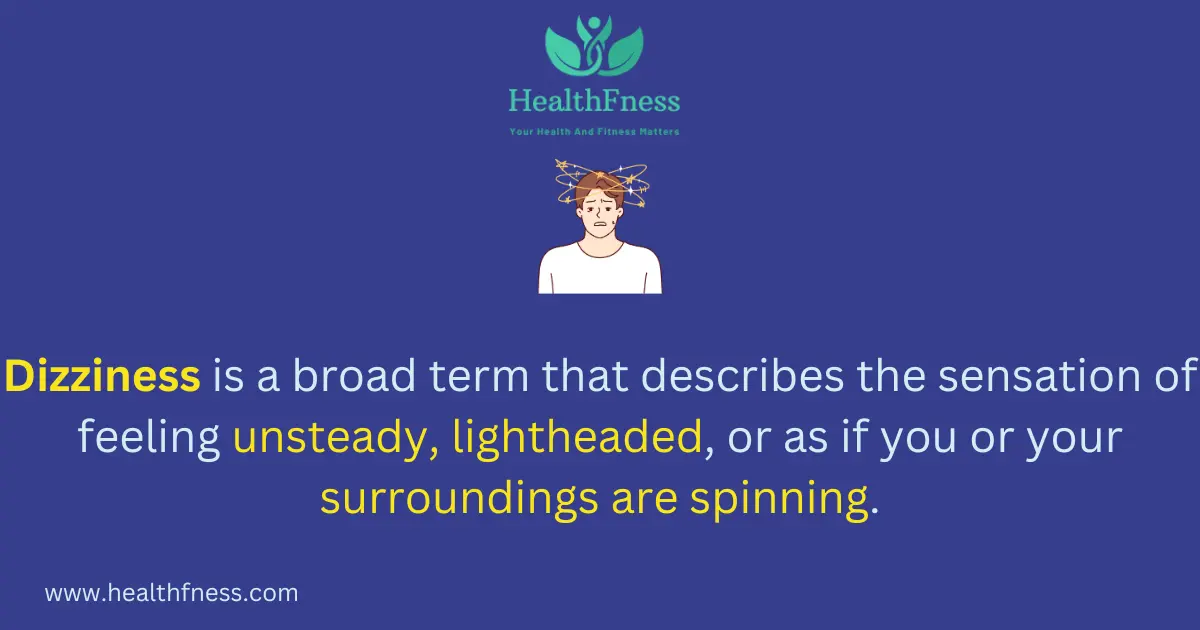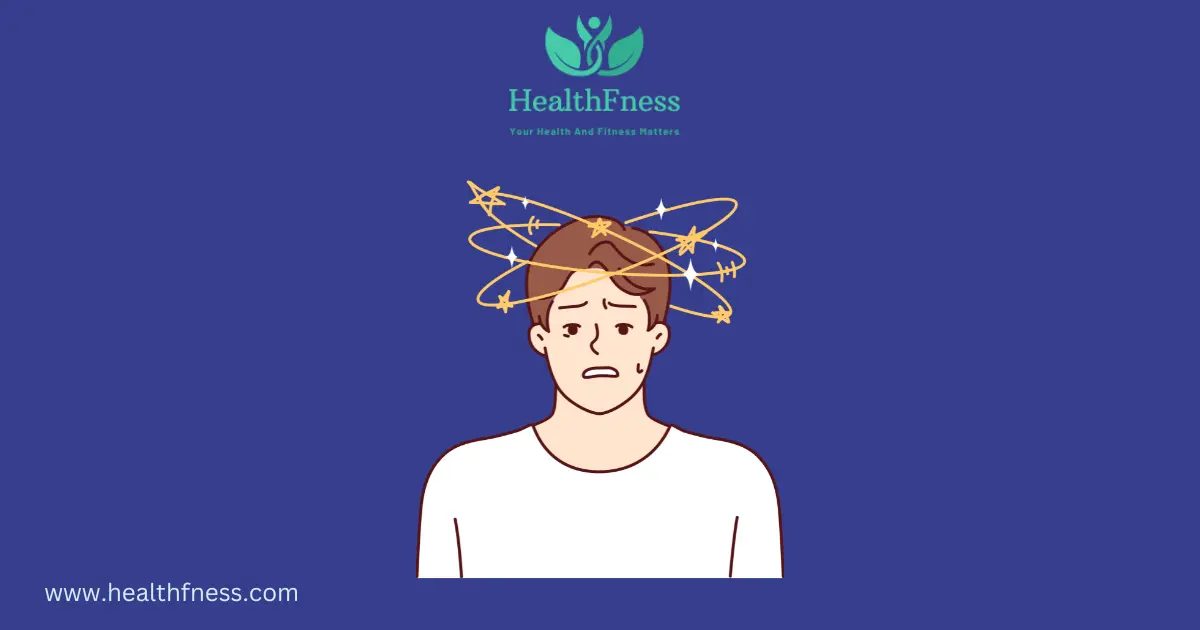Ever find yourself dizzy and exhausted, wondering why? You’re not alone. Many face these struggles daily, impacting their lives. But fret not! In this post, we explore the connection between dizziness and fatigue, offering clarity and solutions.
So Let’s Get Started.😊
In the battle against dizziness and fatigue, knowledge is your most potent weapon.
Understanding Dizziness and Fatigue
Why do I feel both dizzy and lightheaded?
Feeling tired and dizzy is a puzzling sensation that could leave you looking for answers. Feeling dizzy and lightheaded can happen when your body’s balance gets a bit wonky. Imagine your body as a super smart machine. Sometimes, it might not get all the right signals, which can make you feel off-balance.

When you’re dizzy, it’s like your head is spinning, and when you’re lightheaded, it’s like your head feels all floaty. Both feelings often go hand in hand because they’re both about your body’s balance being a bit wonky.
The Complex Interplay of Dizziness and Fatigue
Dizziness and fatigue share a complicated interplay. Fatigue can make you extra liable to feel lightheaded, and conversely, dizziness can make you feel tired. This vicious cycle can considerably affect your life. Understanding this relationship is curical. You can easily understand their relationship by reading the table given below:
| Aspect | Dizziness | Fatigue |
| Definition | The sensation of unsteadiness or spinning | Persistent and overwhelming tiredness |
| Common Causes | Dehydration, low blood pressure, anemia | Lack of sleep, medical conditions, stress |
| Duration | Can be short-lived or chronic | Can be short-term or chronic |
| Impact on Daily Life | May affect activities requiring balance | Can hinder physical and cognitive functions |
| Diagnostic Tests | May require inner ear and blood pressure tests | Blood tests, sleep studies |
| Treatment Options | Depends on the underlying cause | Rest, lifestyle changes, medical treatment |
You May Also Like To Read: The Miraculous Healing Power of Castor Oil for Migraine Headaches
What Causes Dizziness and Fatigue?
There are a lot of reasons which can cause dizziness and fatigue. Let’s understand all possible reasons. So you can identify yours and take informed steps to solve this problem.
- Dehydration: When you don’t drink enough water, your body gets thirsty, and you might feel dizzy and tired. It’s like your body’s engine running low on fuel.
- Low Blood Sugar: Your body needs sugar for energy. When your blood sugar levels drop too low, you might feel shaky, dizzy, and super tired, just like when your phone battery is almost dead.
- Anemia: Imagine your body needs little helpers called red blood cells to carry oxygen. If you don’t have enough of these helpers, you might feel tired and dizzy because your body isn’t getting enough oxygen, like when you’re trying to breathe with a stuffy nose.
- Stress: When you’re super stressed, your body can get all out of whack. Your heart might beat faster, and you might feel dizzy because your body’s like a car revving too hard.
- Sleep Problems: If you’re not getting enough sleep, it’s like your body’s not getting the chance to recharge its batteries. This can make you feel dizzy and exhausted, like trying to run on empty.
- Medication Side Effects: Some medicines can make you feel dizzy or tired as a side effect. It’s like they’re flipping a switch in your body that makes you feel off-balance or sleepy.
- Viral Infections: When your body fights off a virus like the flu or a cold, it’s like going into battle. This can make you feel drained and dizzy as your body works hard to kick out the invaders.
- Inner Ear Problems: Your inner ear helps with balance, just like a gyroscope in a toy helicopter. If there’s a problem with your inner ear, like an infection or inflammation, it can mess with your balance and make you feel dizzy.
- Low Blood Pressure: Blood pressure is like the force pushing blood through your body’s pipes. If it’s too low, your brain might not get enough blood, making you feel woozy and tired, like a car running on low oil pressure.
- Thyroid Issues: Your thyroid is like the boss of your metabolism, telling your body how fast to go. If it’s not working right, you might feel sluggish and dizzy because your body’s not running at the right speed.
If you want to know more about causes Read This.↗
Practical Solutions for Dizziness And Fatigue
- Drink Water: Just like plants need water to grow, your body needs water to work well. So, drink plenty of water throughout the day to stay hydrated and beat dizziness and fatigue.
- Eat Regularly: Your body needs fuel to keep going like a car needs gas. Eating regular meals and snacks with a mix of healthy foods can help keep your energy levels up and fight off dizziness and tiredness.
- Get Enough Sleep: Sleep is like charging your phone battery. Make sure you get enough shut-eye each night so your body can rest and recharge, helping you feel less dizzy and more energetic during the day.
- Manage Stress: Stress can make you feel all out of sorts. Find ways to relax and unwind, like deep breathing, listening to music, or spending time with loved ones. It’s like hitting the reset button for your body and mind.
- Exercise Regularly: Moving your body helps get your blood flowing and releases feel-good chemicals in your brain. Try going for a walk, dancing, or playing your favorite sport. It’s like giving your body a little pep talk to fight off dizziness and fatigue.
- Check Your Medications: Some medicines can make you feel dizzy or tired. Talk to your doctor if you think your medication might be causing these symptoms. They can help find alternatives or adjust your dosage.
- Manage Your Conditions: If you have conditions like anemia or thyroid issues, following your doctor’s recommendations and taking any prescribed medications can help manage your symptoms and reduce dizziness and fatigue.
- Practice Good Posture: Sitting or standing up straight can improve blood flow and help you feel more alert. Imagine yourself like a superhero standing tall and ready to take on the day!
You May Also Like To Read: Can Sitting Cause Headaches?
Home Remedies To Treat Dizziness and Fatigue
Ginger Tea
Ginger is known for its anti-nausea and anti-inflammatory properties, which can help reduce dizziness and boost energy levels. Simply steep a few slices of fresh ginger in hot water to make a soothing ginger tea. Sip on it slowly to ease dizziness and feel more energized.
Peppermint Inhalation
Peppermint has a refreshing scent that can help invigorate the senses and alleviate dizziness. Add a few drops of peppermint essential oil to a bowl of hot water, cover your head with a towel, and inhale the steam for a few minutes. Alternatively, you can rub a drop or two of peppermint oil between your palms and inhale deeply to experience its revitalizing effects.
Deep Breathing Exercises
Deep breathing can help increase oxygen flow to the brain, reducing dizziness and boosting alertness. Find a comfortable seated position, close your eyes, and take slow, deep breaths in through your nose and out through your mouth. Focus on filling your lungs completely with each breath and exhaling fully. Repeat this exercise for a few minutes whenever you feel dizzy or fatigued to feel more grounded and refreshed.
FAQS
What can cause dizziness and fatigue?
Dizziness and fatigue can end result from different factors, consisting of dehydration, anemia, low blood sugar, and more.
Why do I feel dizzy and tired and weak all of a sudden?
Sudden dizziness and fatigue may be resulting from factors like low blood sugar, dehydration, or unexpected adjustments in role.
How do I stop dizziness and fatigue?
Managing dizziness and fatigue involves identifying the underlying cause and taking appropriate measures, along with staying hydrated and preserving stable blood sugar tiers.
When should you worry about dizziness?
You ought to be concerned about dizziness if it is observed by using excessive signs, loss of awareness, or occurs after a head injury.
What deficiency causes dizziness?
Anemia, specifically iron-deficiency anemia, can lead to dizziness due to a loss of purple blood cells.
Is dizziness a brain problem?
Dizziness can be related to different factors, which includes internal ear problems, low blood pressure, or even neurological situations.
What are the top 5 causes of dizziness?
The top reasons for dizziness include low blood stress, dehydration, anemia, internal ear problems, and adjustments in blood sugar ranges.
Can stress cause dizziness?
Yes, stress can make contributions to dizziness. It can also lead to muscle tension and changes in blood pressure that bring about dizziness.
Can anxiety cause dizziness?
Anxiety can cause dizziness due to hyperventilation and increased coronary heart charge.
Conclusion
- Understanding the connection between dizziness and fatigue is crucial for managing these symptoms effectively.
- Dizziness and fatigue often go hand in hand due to disruptions in the body’s balance and energy levels.
- Various factors, including dehydration, low blood sugar, stress, and medication side effects, can contribute to feelings of dizziness and fatigue.
- Practical solutions such as staying hydrated, eating regularly, getting enough sleep, managing stress, and exercising can help alleviate symptoms.
- It’s essential to consult with a healthcare professional to identify underlying causes and receive appropriate treatment.
- Home remedies like ginger tea, peppermint inhalation, and deep breathing exercises offer natural ways to alleviate dizziness and fatigue.

Dr. Mark Jenkins, MD - General Physician (California, USA)
Dr. Mark Jenkins is a board-certified general physician based in the United States, specializing in preventive medicine, nutrition, and lifestyle health. With years of clinical experience in primary care, he is dedicated to helping patients and readers alike make informed, science-based decisions about their well-being.
As a trusted medical reviewer and contributor to Healthfness.com, Dr. Jenkins ensures that all health content meets the highest standards of accuracy, safety, and evidence-based medicine. His expertise bridges modern medical science with practical, everyday wellness strategies, making complex topics approachable for all audiences.
Outside the clinic, Dr. Jenkins is passionate about living the healthy lifestyle he teaches. He enjoys hiking with his dog, experimenting with vegetarian cooking, and exploring the latest health research. He believes that small, consistent lifestyle changes lead to lasting health improvements, and he aims to inspire readers to take proactive steps toward a healthier, happier life.
Explore more of Dr. Jenkins’ evidence-based insights at Healthfness.com



